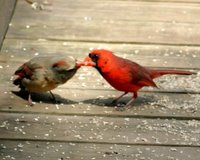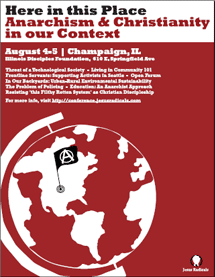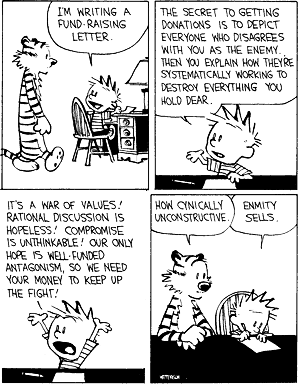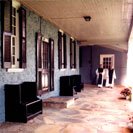We went to mass Saturday evening and during the gospel reading (Mk 5.21-43) these words of Jesus struck me:
"Do not be afraid. Just have faith."
Afterwards, we walked out of town, back to the church we had stayed at the night before, where I hoped to be able to clean up before Sunday morning. But I didn't find anyone there, and no hose either.
But on our way to Berryville Sunday morning, we crossed a stream. A beautiful, clear stream, flowing fast over the rocky streambed. So I climbed down and washed. A cold baptism, with the morning sun in the trees. I wish I could do that every morning.
When we got to town, we noticed a sign to the Emmaus church. Which sounded like a good place to be led to. So we went in and enjoyed their friendliness and enthusiastic, heartfelt (and pretty loud) music. The preaching was barely tolerable, though, filled with July 4th references to freedom and blood and implied comparisons with Jesus. How can Christians be so blind to the vast difference between Jesus, dying innocently, without resisting, and the soldier who dies with a weapon in his hand?
But we were encouraged when Kip and Samantha Walraven invited us to dinner at their home, along with three other couples from the church. Much food followed, and much discussion. Perhaps the best opportunity so far to talk of the symbolism and meaning of pilgrimage in the Christian life. Then, because it was so hot, they offered to drive us the rest of the way to the Abbey.
My impressions at the monastery surprised me. The abbot, Robert, welcomed us and personally brought our meals the first day we were there, before rooms in the guest house became available. Quite an honor for us, after four days as strangers on the road.

But what impressed me more was something completely different. Sunday evening I looked out the window and saw a pair of cardinals, the male a striking red, the female with paler brownish feathers. The male was eating a berry. Then he clutched another berry in his beak, hopped over to the female, and turned to her, cocking his head. She looked. Then eagerly plucked the red berry from his mouth.
The next morning at mass, we sat directly behind a young Asian couple. Throughout the service they scarcely touched. Yet watching them, their way of interacting, I felt an overwhelming sense of the rightness, the goodness, between a man and a woman. The complementarity. Perhaps because they were Asian, I thought of the symbol common in Asian religions:
yin-yang. Female, male; soft, hard; dark, light; warm, cool; rest, activity; earth, heaven... It suddenly felt so incredibly good, so beautiful, so perfect. A strange impression to get at a monastery.
Later I was reading Leon Uris's
Exodus, about the return of the Jews to Palestine. And one of the characters began quoting from Song of Solomon to his lover. This brought me a deep feeling of joy. Heather and I have often quoted those same lines to each other.
The rest of the day, I was near ecstasy. I read and walked through the fields, surrounded by the Appalachian foothills, and piped exultantly from the woods.
And I thought about Heather and our experience with the Mahoneys, about Plow Creek and our hopes for the future. A saw how much I had doubted and feared during these past few weeks. What I'd grasped for and was afraid of losing. And I felt the depth of Jesus' words, "Do not be afraid, just have faith." I was filled to bursting.
Then I knew how I must go forward. I must forget how desperate we are for a place to raise a family. I must forget how much I want Heather. I must forget the countless roadblocks and impossibilities.
All that matters is the goodness, the beauty, the perfection of what God has given. Our love for each other. The love that can exist in Christian community. The love that can be shown to the
anawim who come from the city to be quiet and listen to God. These are so right, so good. I must pursue them. Even if I fail, even if it seems I have no chance of success, I must pursue them. Because only God could offer something this good.
I remember thinking the same way when I started out on pilgrimage from the Abbey six years ago...
p.s. Colette McClain told us about a
bike trail that we could take into Washington, DC, to get away from the heavy traffic. We'll probably get on it tomorrow.
 I didn't expect to be here in Evanston this summer, but now that I'm here it's working out well. They need help here, caring for the man I used to take care of when I lived here before; his current caregiver just got another job. So I arrived right on time.
I didn't expect to be here in Evanston this summer, but now that I'm here it's working out well. They need help here, caring for the man I used to take care of when I lived here before; his current caregiver just got another job. So I arrived right on time.














 subscribe
subscribe